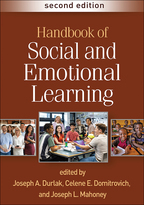Handbook of Social and Emotional Learning
Second Edition
Edited by Joseph A. Durlak, Celene E. Domitrovich, and Joseph L. Mahoney
Foreword by Maurice J. Elias
Introduction by Timothy P. Shriver
Afterword by The Weissberg Scholars
HardcoverPaperbacke-bookprint + e-book
Hardcover
orderJanuary 1, 2025
ISBN 9781462555628
Price: $113.00 650 Pages
Size: 7" x 10"
Paperback
orderDecember 12, 2024
ISBN 9781462555611
Price: $75.00 650 Pages
Size: 7" x 10"
e-book
orderDecember 19, 2024
PDF and Accessible ePub ?
Price: $75.00 650 Pages
ePub is Global Certified Accessible
print + e-book $150.00 $90.00
orderPaperback + e-Book (PDF and Accessible ePub) ?
Price: 650 Pages
ePub is Global Certified Accessible
“This definitive handbook delivers a comprehensive blueprint for SEL science, practice, and policy. It emphasizes that high-quality, evidence-based SEL programming is not just about academic success—it's about equipping students with vital skills for lifelong well-being and achievement. The volume also speaks to the important need for school leaders, educators, and parents to elevate their own social and emotional competencies, so they can drive and sustain children’s healthy development.”

—Marc A. Brackett, PhD, Professor in the Child Study Center and Founding Director, Yale Center for Emotional Intelligence, Yale University
“There is no question about SEL that is not taken up by the second edition of this handbook. Whether you are looking for practical information about implementing SEL interventions in settings that serve children and youth, guidance on systems-level policies, or best practices for supporting the SEL of the adults who work with young people, you will find what you need in this volume. Both answering and raising important questions, chapters map the field and present the scientific foundation for SEL clearly and concisely. The contributors attend to the need for lifetime SEL skill development and the contribution of SEL to our capacity to make the world more just, equitable, and humane. With examples from around the globe, the Handbook takes seriously a cultural and systems-level lens.”

—Nancy L. Deutsch, PhD, Associate Dean for Faculty Development and Linda K. Bunker Professor of Education, School of Education and Human Development, University of Virginia
“This comprehensive text is the premier resource on the critically important topic of SEL for educators, policymakers, and researchers. The second edition provides new and important chapters about promoting equity through SEL, uses of technology, integrating SEL with other school initiatives, creating systems and policies that support SEL, and so much more. I recommend this book for SEL implementers at all levels, preschool through postsecondary, as well as graduate students in school psychology, school counseling, and social work.”

—Brian C. McKevitt, PhD, NCSP, School Psychology Program, University of Nebraska Omaha
“The distinguished editors of this book have assembled a knowledgeable team of researchers and practitioners. Each of the six sections is edited by expert commentators who identify contemporary dialogues and debates in this ever-expanding field. The international contributors provide evidence of the adaptability of SEL in different cultures and in a wide range of contexts. Case studies highlight the need for comparative studies that acknowledge the holistic nature of SEL. Special topics include SEL interventions to help heal the emotional wounds of children and young people affected by war and other devastating crises. This insightful book provides a wealth of knowledge for educators, researchers, health care professionals, and all those concerned for the emotional well-being of children. The dedication of the editors and authors shines through on every page.”

—Helen Cowie, PhD, Faculty of Health and Medical Sciences (Emeritus), University of Surrey, United Kingdom
—Marc A. Brackett, PhD, Professor in the Child Study Center and Founding Director, Yale Center for Emotional Intelligence, Yale University
“There is no question about SEL that is not taken up by the second edition of this handbook. Whether you are looking for practical information about implementing SEL interventions in settings that serve children and youth, guidance on systems-level policies, or best practices for supporting the SEL of the adults who work with young people, you will find what you need in this volume. Both answering and raising important questions, chapters map the field and present the scientific foundation for SEL clearly and concisely. The contributors attend to the need for lifetime SEL skill development and the contribution of SEL to our capacity to make the world more just, equitable, and humane. With examples from around the globe, the Handbook takes seriously a cultural and systems-level lens.”
—Nancy L. Deutsch, PhD, Associate Dean for Faculty Development and Linda K. Bunker Professor of Education, School of Education and Human Development, University of Virginia
“This comprehensive text is the premier resource on the critically important topic of SEL for educators, policymakers, and researchers. The second edition provides new and important chapters about promoting equity through SEL, uses of technology, integrating SEL with other school initiatives, creating systems and policies that support SEL, and so much more. I recommend this book for SEL implementers at all levels, preschool through postsecondary, as well as graduate students in school psychology, school counseling, and social work.”
—Brian C. McKevitt, PhD, NCSP, School Psychology Program, University of Nebraska Omaha
“The distinguished editors of this book have assembled a knowledgeable team of researchers and practitioners. Each of the six sections is edited by expert commentators who identify contemporary dialogues and debates in this ever-expanding field. The international contributors provide evidence of the adaptability of SEL in different cultures and in a wide range of contexts. Case studies highlight the need for comparative studies that acknowledge the holistic nature of SEL. Special topics include SEL interventions to help heal the emotional wounds of children and young people affected by war and other devastating crises. This insightful book provides a wealth of knowledge for educators, researchers, health care professionals, and all those concerned for the emotional well-being of children. The dedication of the editors and authors shines through on every page.”
—Helen Cowie, PhD, Faculty of Health and Medical Sciences (Emeritus), University of Surrey, United Kingdom



